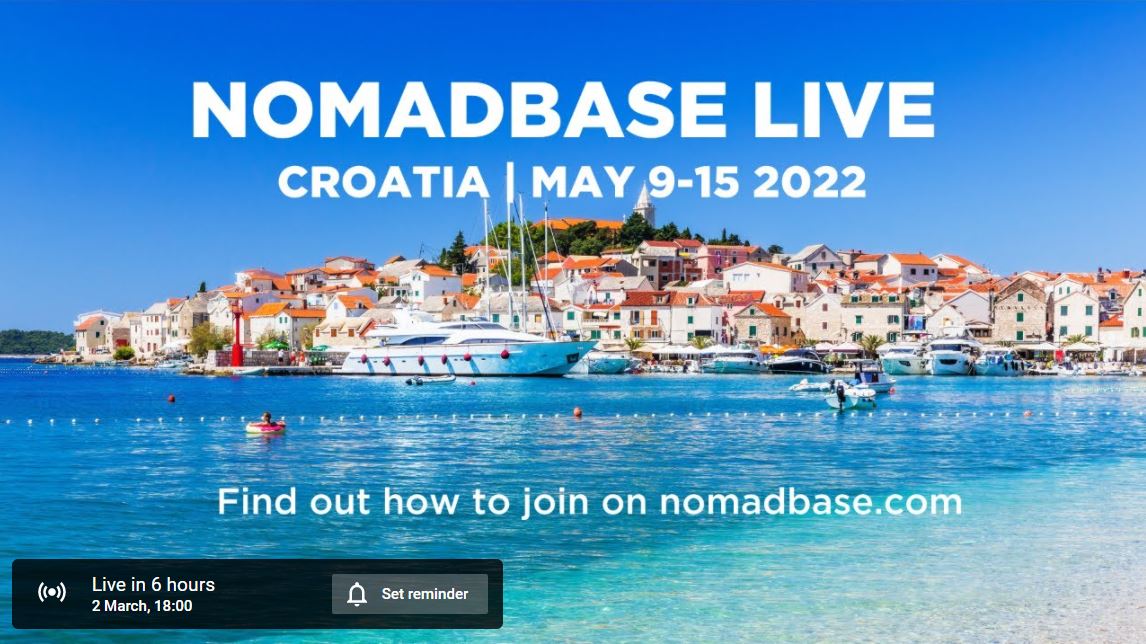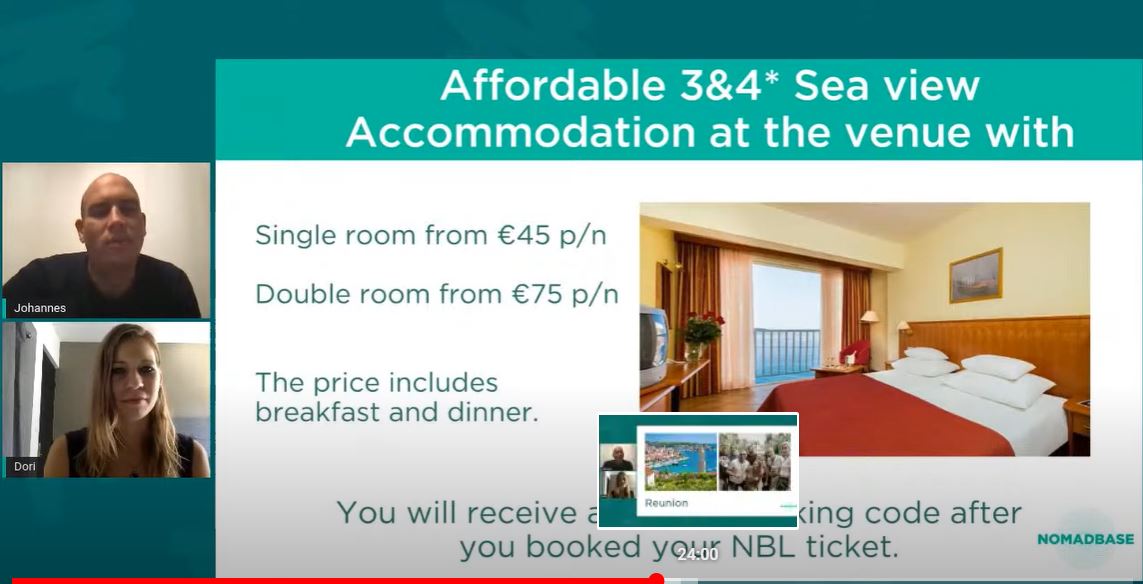Croatian Cheeses: An Introductory Guide
March 2, 2022 - When traveling, experiencing a country’s gastronomical delights is at the top of my to-do lists. Food easily reveals a tremendous amount about the country’s culture and customs, reflecting the unique history, identity, values, and beliefs of its inhabitants. This is definitely the case when it comes to Croatia’s culinary heritage.
There is so much to cover when it comes to Croatia’s food scene. Despite the country’s relatively small size, there is an astounding amount of regional variety.
Let’s get into the swing of things by introducing one of my favorite Croatian products - cheese!
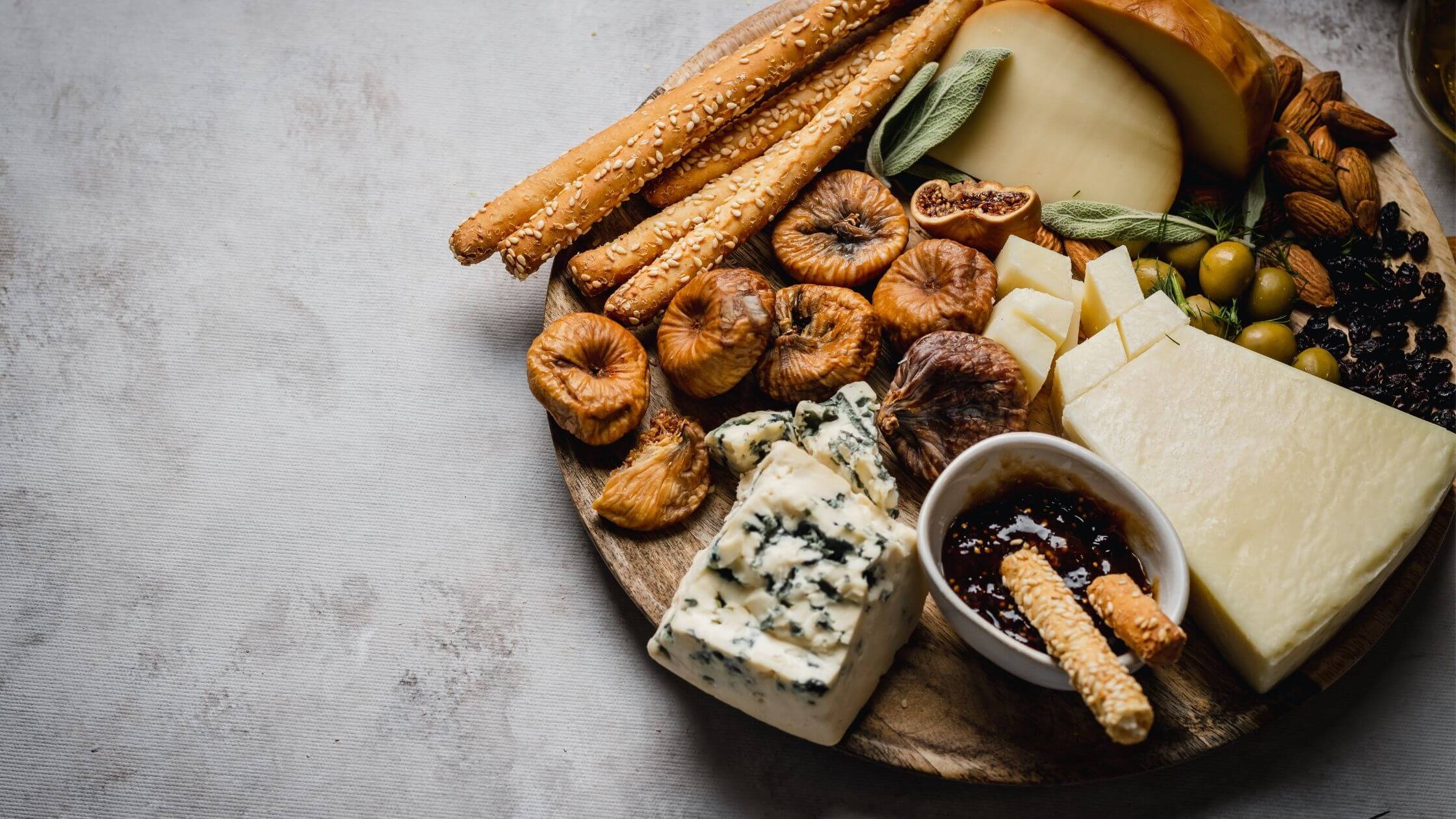
Can't resist a gorgeous cheese plate. Image: Pexels
Oldest cheese found in Croatia
Sir (pronounced s-ee-r), cheese has been an integral part of Croatian history from as far back as 7,200 years, where researchers from Pennsylvania State University found traces of the world’s oldest cheese along the Dalmatian coast.
Although records from the time are scarce, it is theorized that during the 4-5th century BCE, Thracian and Illyrian sheep farmers accidentally produced the first cheeses when milk they kept stored in bags spontaneously fermented and curdled. Today, cheese features heavily in both sweet and savory dishes throughout Croatia such as Burek and Strukli.

Sheep were the dominant livestock for cheese production. Image: Pexels
Yet, on the global culinary scene, Croatian cheeses remained shrouded in relative obscurity due to the lower levels of production, and the disconnect between traditional cheese producers and the international market.
However, this situation started to change when in 2017, Paški sir, a hard sheep’s cheese from the island of Pag with its delectable notes of wild sage and thyme, took home the gold for the best sheep’s milk cheese at the Global Cheese Awards, giving Croatia’s cheeses much-needed recognition.
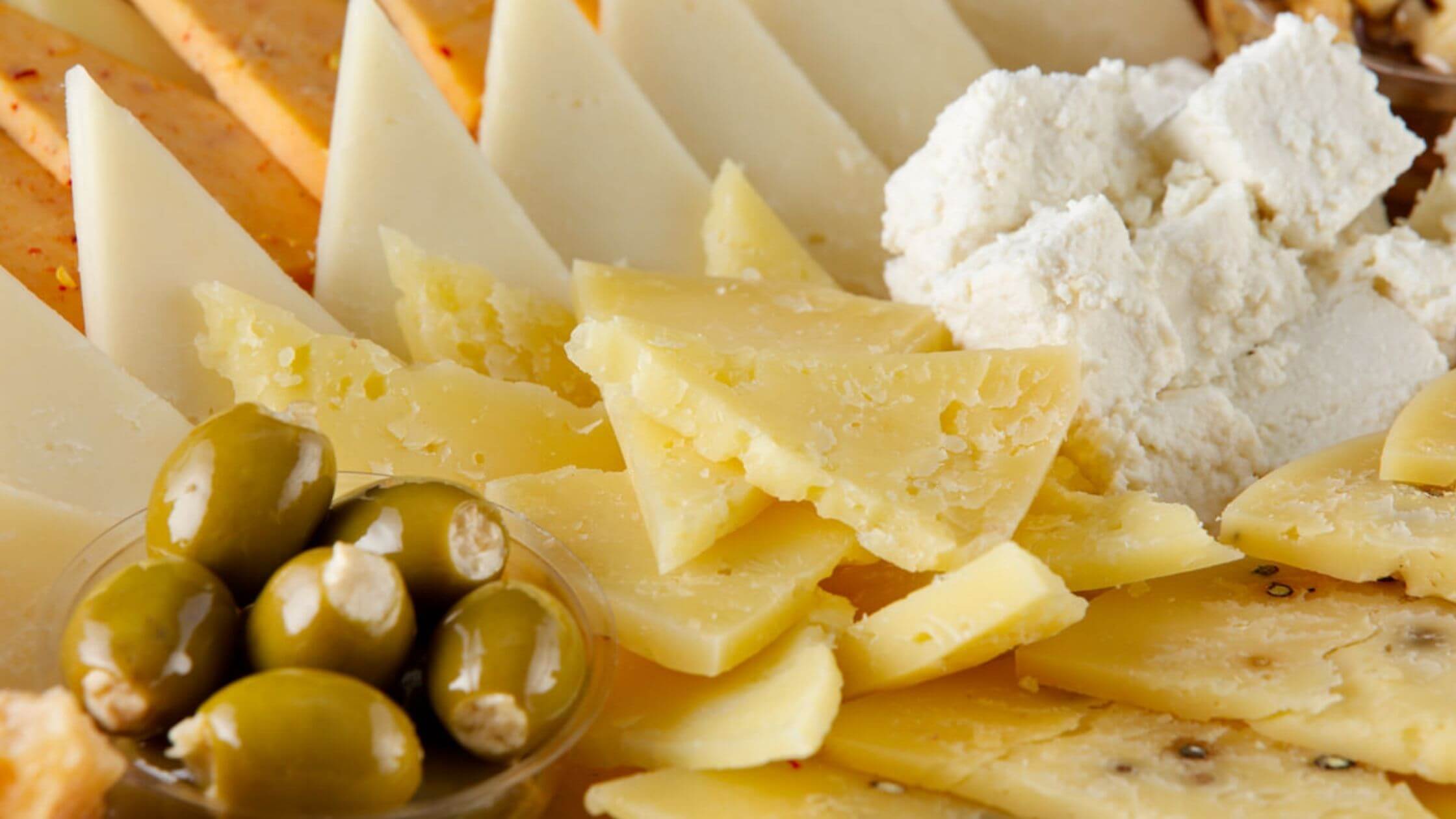
Paški sir. Image: Gligora/Facebook
In recent years, Croatia has seen the launch of new types of high-quality cheese, as both artisanal and industrial producers continue to experiment with new additions and methods. Don’t be surprised to find both industrially produced cheese, alongside homemade cheese, on the tables of Croatian families.
Croatian cheese galore
This might come as a surprise but despite its small production, Croatia still boasts a mind-boggling variety of delicious cheeses like Škripavac, Tounjski, Creski, Sir iz mješine, Prgica, Lećevački, and Basa, just to name a few!
These cheeses are typically made from goat (kozji), sheep (ovčji), cow’s (kravlji) milk, or a combination of the 3.
Like Croatian food in general, cheese offerings tend to vary between regions but one of the staple cheeses that can easily be found on the shelves of every grocery store is svježi sir, or fresh cheese.
Svježi sir is typically associated with the regions of Zagorje and Prigorje, about an hour's drive north of Zagreb. This creamy, delicate soft cheese is often consumed at breakfast and is made by processing cow’s milk which gives it its signature mild tanginess, comparable to greek yogurt.
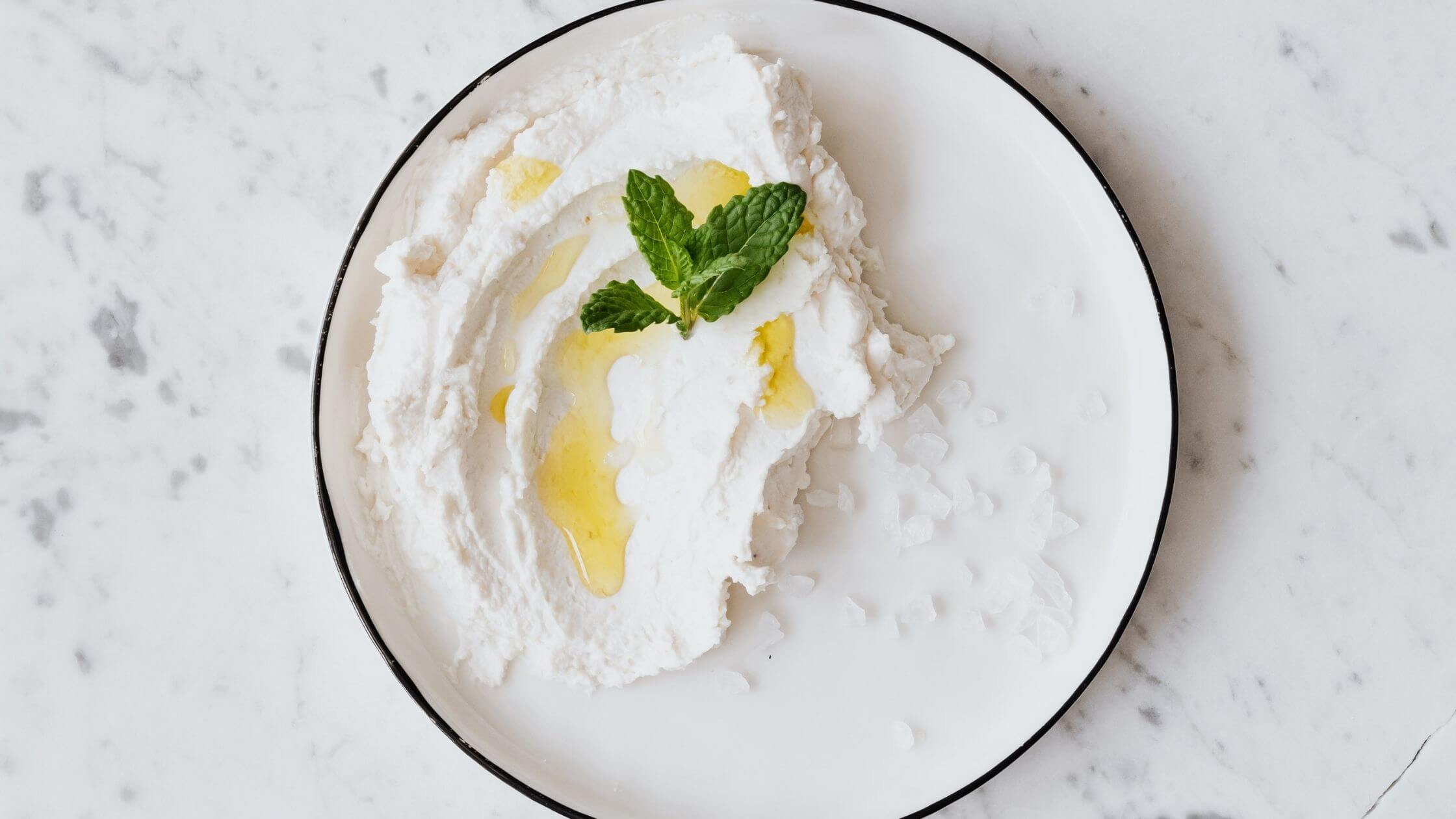
Svježi sir, Croatia’s unsung hero of cheese. Image: Pexels
Derivatives of Svježi sir also include Posni sir, a low fat, smooth, spreadable version, and Zrnati sir which has a grainy texture that most closely resembles cottage cheese. More recently, Icelandic Skyr has also found local popularity due to its high protein, low-fat content. Although consumed like yogurt, Skyr is actually a sour milk cheese.
Another type of Croatian cheese that is commonly sold at farmers' markets is what is known as Kuhani sirevi, or cooked cheese.
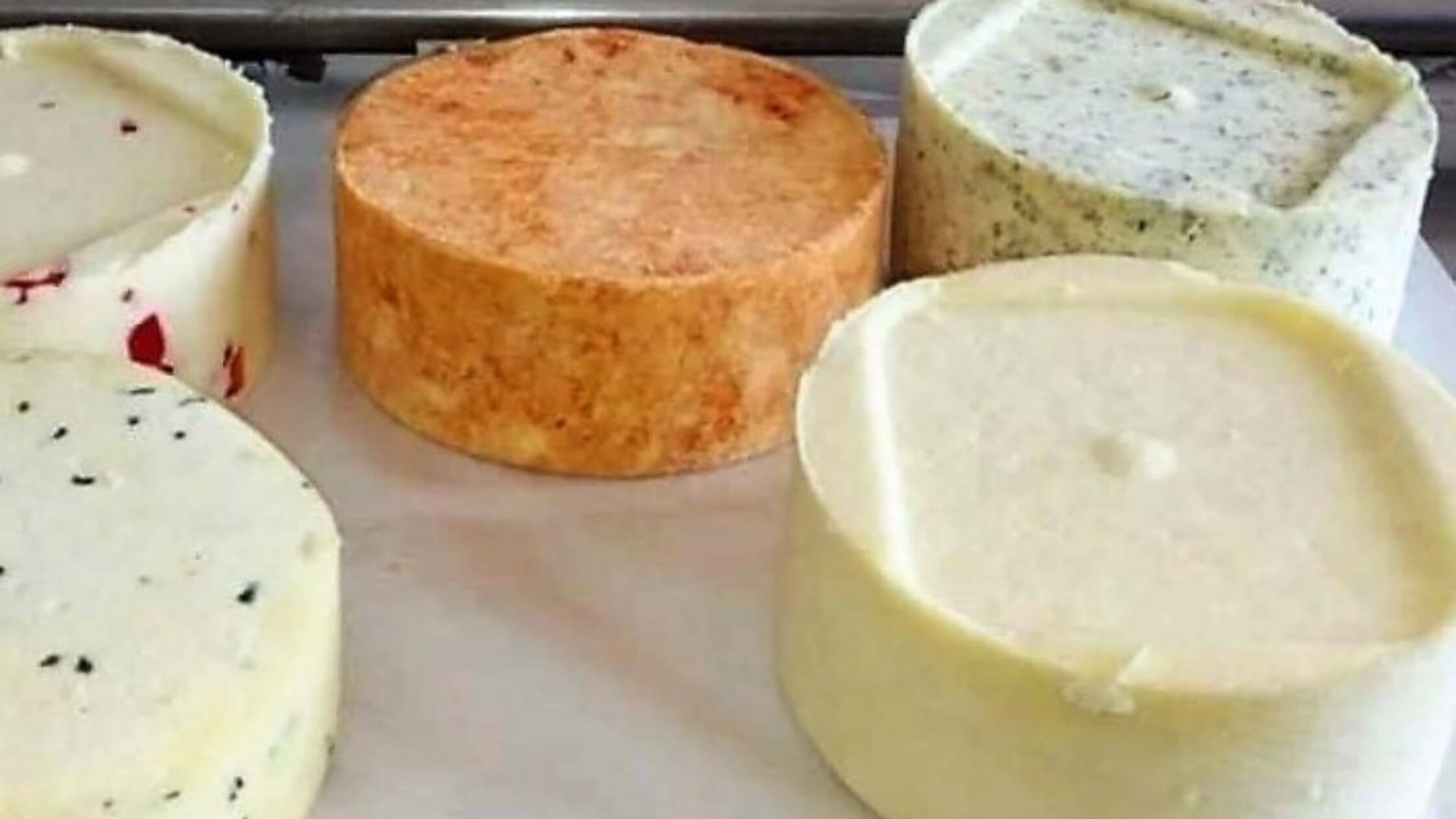
Different types of Kuhani sirevi. Image: Mate Bojčić/Facebook
Kuhani sirevi gets its name from the preparation method where cow’s milk is boiled (i.e. cooked) and curdled with vinegar, before the addition of salt and various spices such as paprika, basil, dill, and oregano.
The result is a semi-hard, rich cheese with a mild chew that when eaten on its own, has a sweet, clean, and grassy flavor. Some producers also smoke this cheese to produce a variant called Dimljeni sir, giving the cheese a delightful smoky aftertaste.
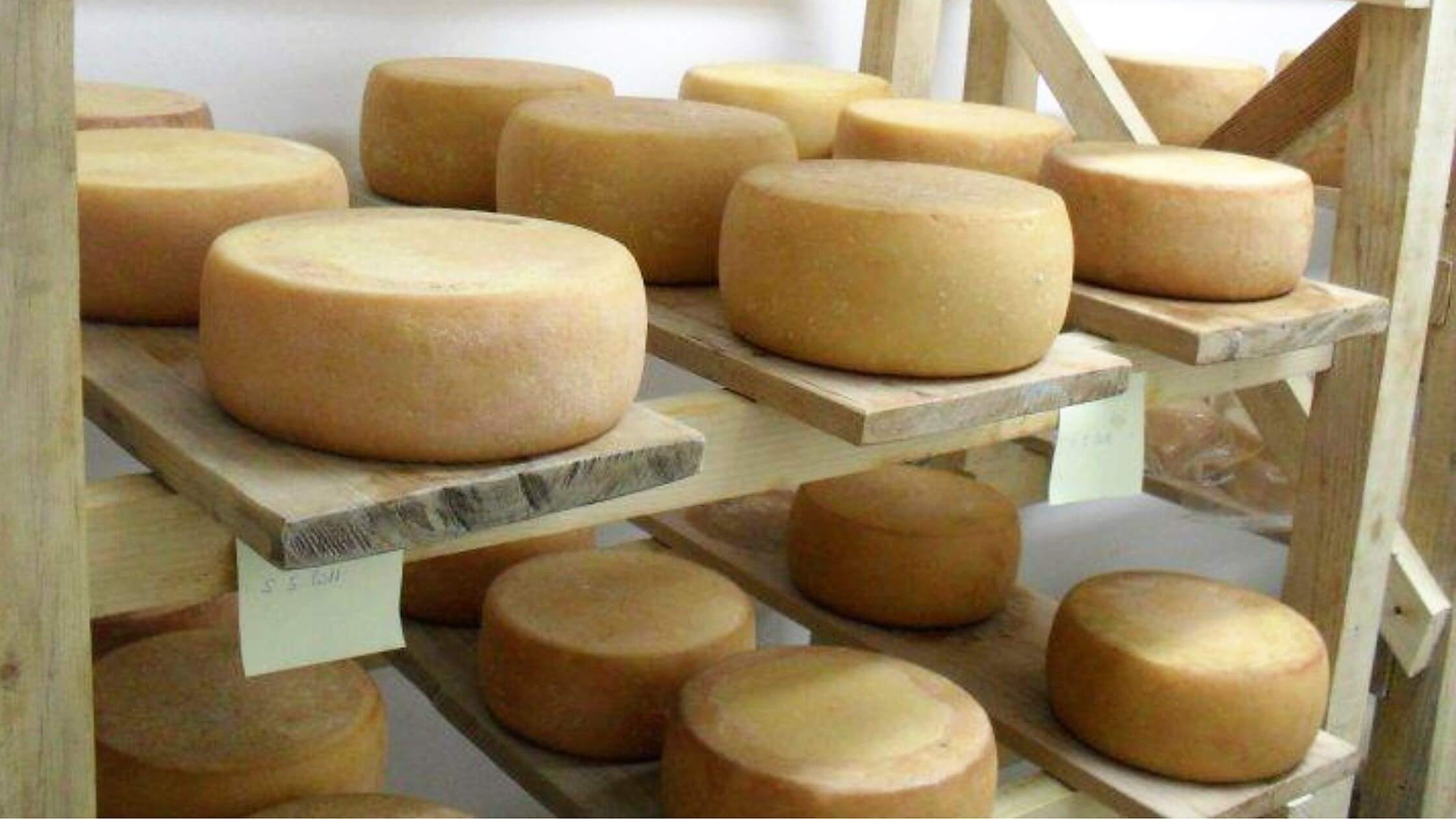
Aging Lećevački cheese. Image: Njuškalo.hr
Closer to (my) home, Lećevački sir may be one of the most widely recognized Dalmatian hard cheeses, having won several awards in the past. In fact, it was so well-received even back in the day that it was served in the Court of Austrian Emperor Francis Joseph (1848-1850).
This cheese originates from the Split hinterland and is made from the milk of either cow, sheep, or a mix of both. It has a mild, grassy aroma with a sharp, slightly spicy aftertaste as a result of the Mediterranean herbs (e.g. rosemary, thyme, sage) that the livestock graze on. Some culinary enthusiasts have even likened aged Lećevački sir, to Paški sir with its nutty notes and crunchy flavor crystals.
Sir iz mišine is a cheese produced in the regions of Zadar, Šibenik, Split and Dubrovnik. Sir iz mišine used to be made exclusively from surplus sheep’s milk, but is today produced with a mix of goat and cow milk.
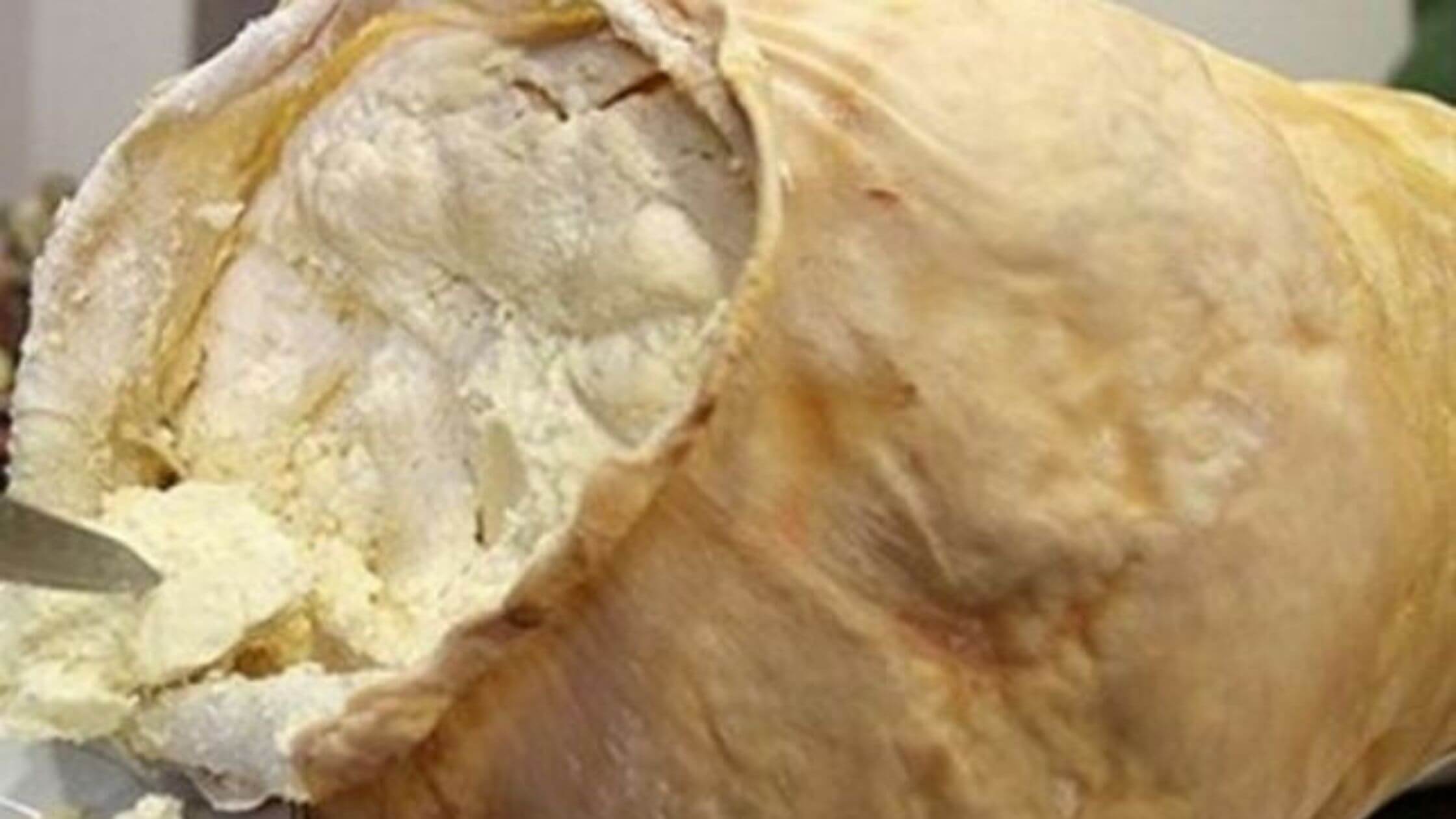
Sir iz mišine, sold from its lambskin sack. Image: Njuškalo.hr
What makes this cheesemaking process unique is that the milk is aged in lambskin sacks (mišina), made from 6-month-old lambs. When the cheese is ready in the fall, it is transported and sold from these same lambskin sacks. This aging technique also imparts a distinct earthy aroma to the cheese, which is often used as an ingredient to flavor various dishes.
Unfortunately, this cheese is becoming more scarce since the process is kept alive by only a handful of cheesemakers in the region, so do try it if you chance upon it in a market.
Last but not least, there is Težački sir. Težački sir is a hard pasteurized Dalmatian cow milk cheese, aged for a minimum of 4 months. Some producers use this cheese to produce other varieties such as Težački Iz Maslinove, where the same cheese is aged for at least 6 months in pressed olive skins. As the wheels age, the cheese absorbs the flavor and aroma of the olives.
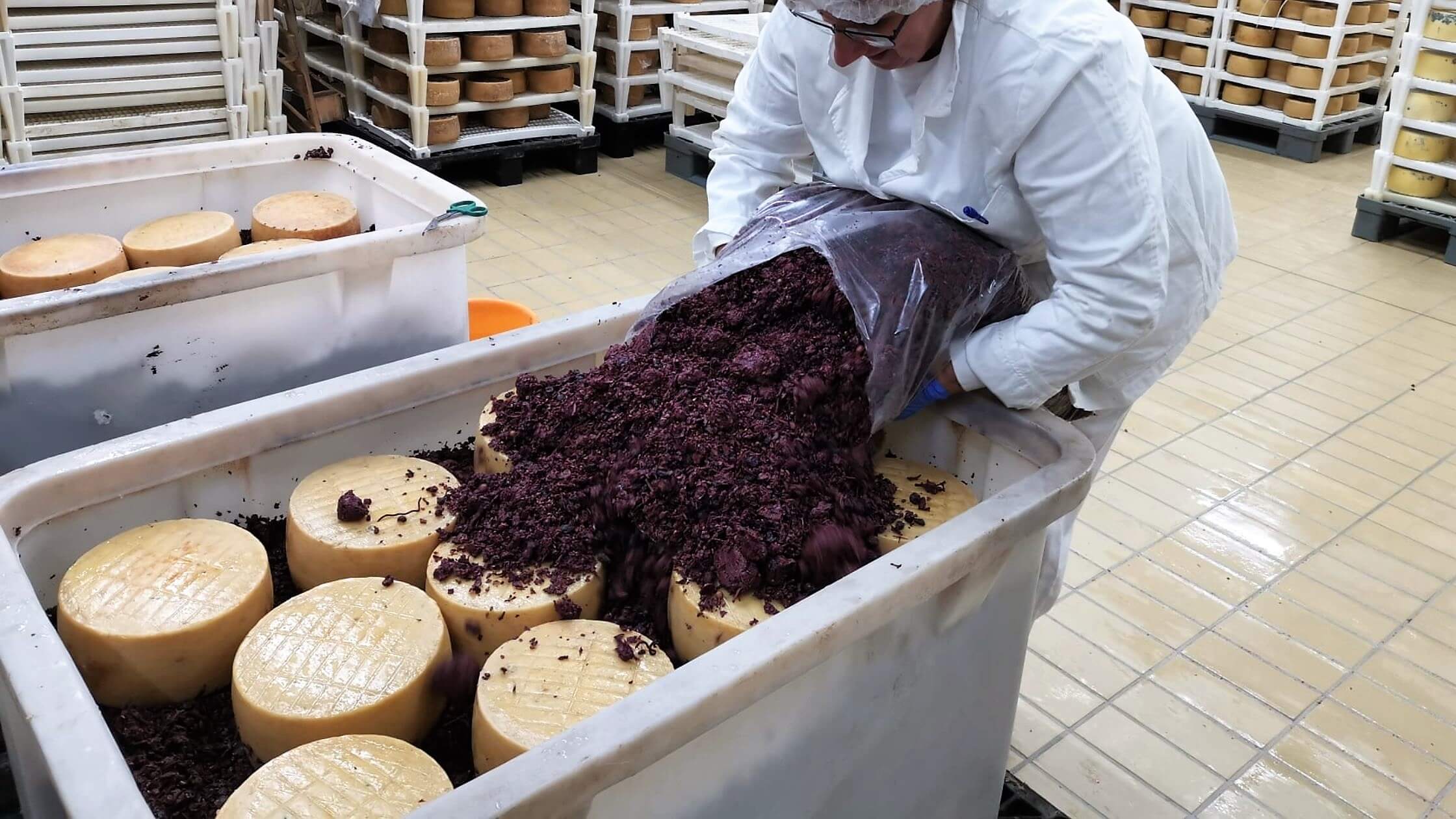
The making of Težački Iz Maslinove at Gligora. Image: Gligora/Facebook
BONUS! How to get the best of both worlds with a method of storing cheese that is unique to the area of Dalmatia and surrounding islands. Semi-hard cheeses are diced into cubes and stored in earthen, or glass containers filled to the brim with olive oil. This way, you get to try the best of Dalmatian cheese and the region’s luscious olive oil.
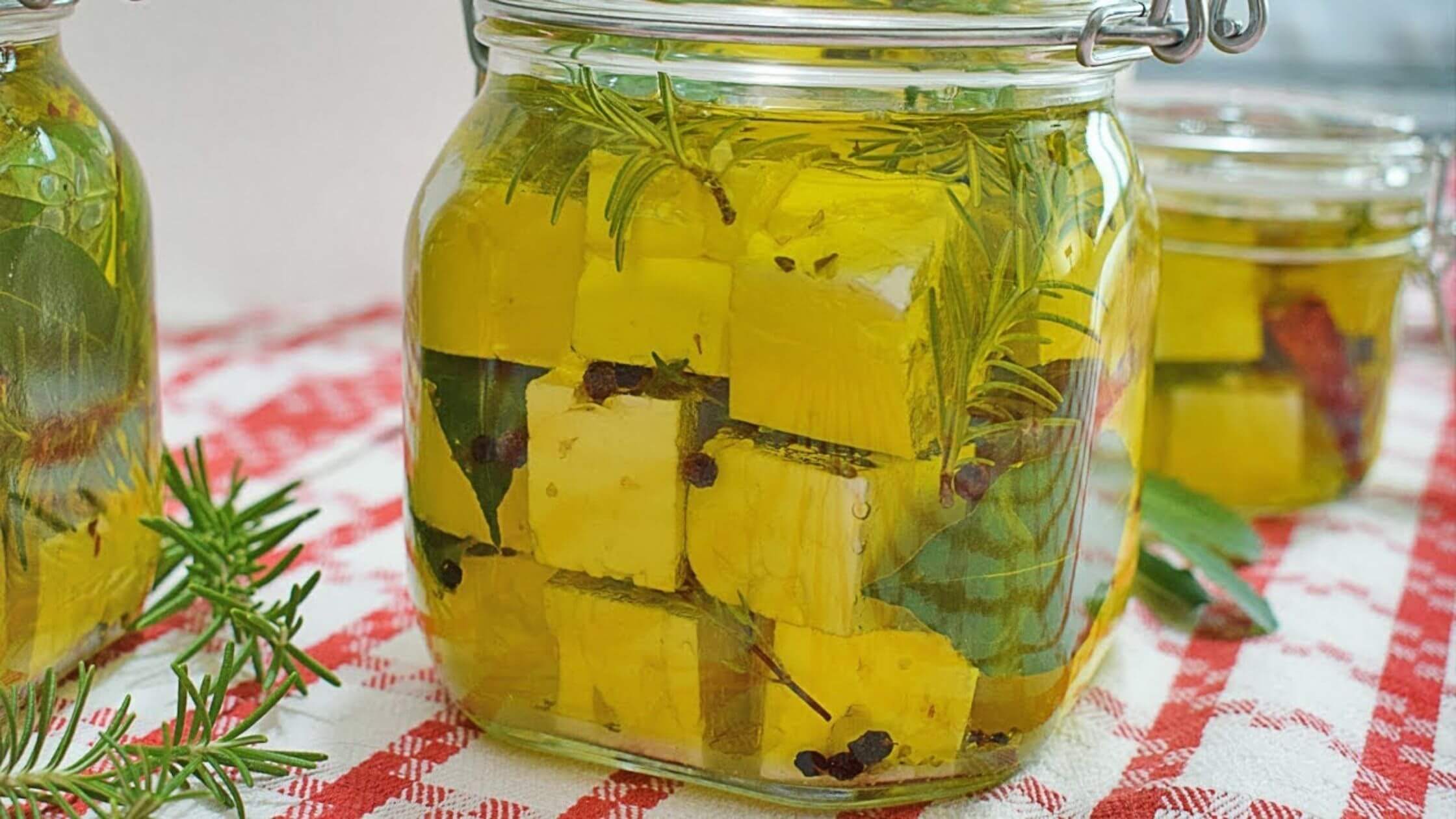
Sir u ulju, cheese preserved in olive oil for the best of both worlds! Image: My Tasty Pot/YouTube
A quick note on pasteurization
Some Croatian cheeses, in line with European cheese production standards, are made from “raw”, unpasteurized milk that comes straight from the animal. This process is forbidden and/or highly restricted by countries such as Canada, Australia, and the U.S.
Check for labels stating that the product is pasteurized - pasterizirano, or pasteurized and homogenized - pasteriziran i homogeniziran, or if you’re in a restaurant, ask staff for clarity on this.
All in all, I hope this short guide will help you traverse some language barriers and uncertainties when it comes to trying a slice of Croatia’s culinary wonders. Dobar tek!
For more on Croatian products, producers, companies, and exports, make sure to check out Made in Croatia.
A New Nomad Destination is Born as Nomadbase Chooses Primosten
March 3, 2022 - Primosten is the place to be in May, as Nomadbase announces the pretty Dalmatian coastal town close to Split for its Nomadbase Croatia conference.
The ecosystem is developing.
Zagreb, Split, Zadar, Dubrovnik, Hvar, Rijeka, Pula, Osijek - all are Croatian destinations which are becoming attractive to digital nomads in the remote work revolution.
And now we can add another name to that list - Primosten.
The first digital nomad travel and business club, Nomadbase, has announced its third meetup, after successful events in Cyprus and Mexico. Founder Johannes Voelkner announced in a YouTube webinar that the gorgeous coastal town of Primosten - a short drive north of Split.
It is not a destination which has been associated with digital nomads before, but that is set to change, as around 500 members of the Nomadbase are expected to descend on Primosten for the next 7-day conference, from May 9-15.
Voelkner gave a lot more detail on the event in the YouTube webinar which you can watch below. He also said that they were going to host a subsequent event in Croatia a couple of weeks later, as they did in Mexico.
Great news, and even more content for digital nomads in May.
Croatia is shaping up to be an attractive destination for nomads for May and June this year. In addition to the Nomadbase events, we will shortly be announcing two more great nomad conferences - Work. Place. Culture. in Dubrovnik from May 5-7, and Zagreb Digital Nomad Week 2022 in June. So maybe hold off booking your flights for a couple more days until you learn what other magic is on offer in Croatia during two of the best months to visit.

Nomadbase has a dedicated page where all the information for Primosten will be updated - you can find it here.
For more news and features about digital nomads in Croatia, follow the dedicated TCN section.
Ryanair Pulls Zagreb-Lviv Line, New Volotea Lille-Split Line Announced
March 3, 2022 - The latest flight news to Croatia as Ryanair cancels its Zagreb-Lviv line, and Volotea announces a new line to Split this summer, connecting Lille and Split!
The new Ryanair line between Lviv and Zagreb is no longer on sale. As expected, Ryanair has suspended sales on flights to and from Ukraine due to Russia's invasion, reports Croatian Aviation.
Ryanair announced the line between Lviv and Zagreb in mid-January this year and has plans to operate on it from the very beginning of the summer flight schedule - on March 27. Fights were planned twice a week, every Wednesday and Sunday.
The Irish airline closed sales on all routes from Lviv, including the announced route to Zagreb. A total of 22,320 seats were on sale, and Lviv was to be the second city in Ukraine with which Zagreb was to have a direct connection.
Ryanair has announced its return to Ukrainian airports as soon as security conditions allow.
Furthermore, Spanish low-cost airline Volotea has announced another new route to Split Airport this summer, reports Croatian Aviation.
Namely, Volotea, which has its bases not only in Spain, but also in France, Greece, and Italy, is introducing another new route to Split Airport this summer, regularly connecting Split and Lille, a city in northern France with more than 220,000 inhabitants.
The first flight on the new line has been announced for May 8, and flights will run every Sunday until October 9 this year.
A319 aircraft with a capacity of 156 passengers have been announced on the route, so Volotea will offer a total of 7,176 seats between the two cities this summer.
This is also the seventh destination of the Spanish airline from France to Split Airport. Tickets for flights from Split to Bordeaux, Lyon, Marseille, Nantes, Nice, and Toulouse are also on sale.
For more on flights to Croatia and other travel announcements, make sure to check out our dedicated travel section.
Op-Ed: Don’t Forget Croatia’s Similar History to Ukraine in War
March 3, 2022 - An op-ed written by TCN contributor Stefan Karlo Rajic about Croatia's similar history to Ukraine in war.
For Croats worldwide, the Ukraine crisis should be hitting close to home in many ways. Croatians in the diaspora and homeland alike can remind themselves of our national histories and wars to know how to best support Ukraine in these trying times. Both countries have had eastern neighbours that have caused us great suffering, but what is most telling are the similarities to how the wars are happening.
To begin his invasion, Putin delivered a horrifying speech. He essentially stated that the nation-state of Ukraine was a mistake and that he would fix it militarily. This immediately should remind Croatians of their proclamation of independence in 1991 after a free and fair referendum in which 97% of Croats voted to leave Yugoslavia and form their own independent nation-state. Then, Slobodan Milosević drew on imperialist Serbian nationalism to stoke the flames of war. Much like Putin, he saw his western neighbour’s independence as a threat to his own goals as a leader. However, while Putin is trying to re-create an empire, Milosevic was trying to hold a crumbling one together.
Fighting in Vukovar was a hard war to sell to the Yugoslavian people; after all, the creation myth of Yugoslavia was a fraternity of nations with similar languages and cultures bonded together with socialist ideals under a common flag. There were mass desertions, disobedience, and overall low morale for what seemed like a pointless war to kill brothers in the initial mobilisation for war. It was not until Milosevic started making accusations that fascists ran the newly independent Croatia and that the Western powers (USA and Germany) were trying to steal Croatia away that popular support for his war began. This also is a common thread with Ukraine, as Putin has claimed that Ukraine is run by Nazis, when in fact, their president is Jewish whose relatives suffered in the holocaust. This is similar to Croatia, whose president Tuđman was a former Yugoslavian general who fought against the fascists. De-Nazification is another excuse made by these imperialists to fuel wars against democracies like Ukraine and Croatia.
The Battle of Vukovar is a tragic tale of heroism that stands uniquely in the history of Croatia’s war for independence and might be the template of what is to come in Ukraine’s Eastern regions. Without significant arms, outnumbered 20 to 1, and with no artillery or aerial support, the Croatian defenders in Vukovar held out for 87 days. The city received the worst bombing in the history of combat operations; per square metre, Vukovar was bombed worse than Stalingrad. Hundreds of civilians were killed in these bombing operations using unguided munitions. The same is already happening in numerous Ukrainian cities, with nearly 400 civilian casualties reported in just the first four days of combat.
Similarly, Ukrainian troops are outnumbered and outmatched in terms of equipment. Military experts believe that the Russian army’s tactics are about to get far uglier. And their worst fears are that Ukraine may become a victim of many Vukovar-like artillery campaigns with massive civilian casualties. This is concerning for us all as the Russian army is far better equipped for mass devastation than the Yugoslavian army of 1991.
However, we should also remember the aftermath of the Battle for Vukovar. With an army fuelled by Nazi rhetoric, occupation troops embarked on a campaign of ethnic cleansing, killing hundreds, including women, sick, and elderly in Ovcara, believing they were liberating the world of evil. There are already reports on the ground that Russian occupation troops are in cities looking to assassinate critical targets. This is even before any major city has been fully captured. With the likely capture of cities in the coming weeks likely, the execution of the so-called “kill lists” publicly released by the USA will be actioned, with devastating mass causalities. The liberation-from-Nazis rhetoric of both Milosević and Putin are direct precedents for mass war crimes and terror against the civilian population at large. What is scarier in the case of Ukraine is the sheer scale of terror that will be employed in many more cities.
Our concern must translate into lobbying our governments in the diaspora and homeland to send more aid to help the Ukrainian cause and prevent such tragedies from ever occurring again. Unfortunately, we Croats know all too well what can happen when overwhelming military force combined with imperialist nationalism does. Nevertheless, we can do our part to help Ukrainians avoid a similar fate to Ovcara and Vukovar.
Croatians fought for their freedom and won against all odds. We have a unique understanding of their plight with troubles coming from the East. We have the Battle of Vukovar, and its aftermath etched in our memories. We would do well to remember to push our government to do more in supporting the Ukrainians. My greatest fear is that nearly every major city in Ukraine’s East is a potential Vukovar due to military, politics, geography, and cultural circumstances. We must do what is right and push our governments to do even more in defending the freedom of an independent nation from wanton barbarism from the East.
Stefan Karlo Rajic has a master’s in international relations, specialising in Eastern European politics, focusing on Ukraine-Russia relations from 1991.
For more, check out our politics section.
War in Ukraine Slows Down Travel Bookings in Split-Dalmatia County by 50%
March 3, 2022 - Travel bookings in Split-Dalmatia County have slowed down by almost 50% so far due to the war in Ukraine.
After the tourist market began to recover from the corona crisis, some six hundred kilometers from Croatia, Russia invaded Ukraine.
This will certainly affect guests coming from the Ukrainian and Russian markets. After all, Russian planes can no longer fly in most European countries, including Croatia. But what about the others? For now, it’s hard to say, but Dalmaciija Danas reveals that there could be a reduction in tourist arrivals from distant markets.
The Minister of Tourism and Sports, Nikolina Brnjac, held a coordination meeting with representatives of the largest hotel groups in Croatia. In addition, the possibilities of accommodating refugees from war-torn Ukraine were discussed.
The impact of this crisis on current bookings from the most important markets was also discussed at the meeting. A statement from the Ministry states that bookings are in a slight decline, but it is still good, and it is difficult to talk about estimates in this situation.
"We had already started the preparatory activities for this tourist year before these unpleasant events, and we will adjust them following the further development of this difficult situation, which we all hope will be completed as soon as possible," Brnjac concluded and added that promotional activities on the Russian market have been completely suspended.
Ukrainian tourists recorded 145,568 arrivals, and 857,482 overnight stays in Croatia last year, while Russian tourists achieved 145,592 arrivals and 800,979 overnight stays in 2021.
The Split-Dalmatia County Tourist Board explained that the war in Ukraine slowed down tourist reservations by almost 50 percent, adding that only six days had passed since the war began, so it was too early to say from which markets the decline was most significant.
“During the pandemic, people learned how to behave in emergencies, so 'last-minute bookings' have become a common way of doing business in tourism. This means that if the war ends and the situation stabilizes, reservations will return very soon; that is, tourism will return to normal," the Tourist Board said.
Alijana Vukšić, director of the Split Tourist Board, said that the events in Ukraine would undoubtedly have consequences for the tourism sector.
"Especially when it comes to tourist traffic from distant markets in which travelers view Europe as a whole. How much impact it will leave on tourist traffic between European countries depends on the further course of events," she told Slobodna Dalmacija and added:
"Last year, more than ten thousand tourist arrivals were made by Russians in Split and more than six thousand tourist arrivals from Ukraine. However, it is difficult at this moment to predict the return of tourists from the mentioned markets because it will depend exclusively on the geopolitical situation, which we hope will stabilize as soon as possible," the director concluded.
For more on travel in Croatia, follow TCN's dedicated page.
Meet Vukovar 365, Full of Life – Lucija and Josip Salaić of Vu-Creator
March 3, 2022 – Meet Lucija and Josip of Vu-Creator, a young couple from Tovarnik near Vukovar who have devoted themselves to the sustainable production of some of the most wonderful furniture and toys for the young ones.
Tovarnik, once a year the home of Croatia’s biggest pumpkins and an open-air fine dining experience of ox on the spit, paired with some outstanding local rakija. Dessert, of course, pumpkin, sometimes apples and walnuts in a roll. All part of the famous autumn festival. What does the place offer outside of this magnificent event? Plenty. For now, we’ll skip discussing nature, location, food, and we’ll move straight to people and their stories.
Josip and Lucija Salaić are a young couple who decided to build their careers in something they truly enjoy and care about. Taking inspiration from their own little daughters and from the fact that woodworking was Josip’s true passion, they started designing and manufacturing wooden furniture and toys. Their goal was to create something sustainable, natural, and lasting that would keep the little ones happy. And so, Vu-Creator was born. They design all their pieces according to their client’s wishes, while all the shaping, painting, and assembling is done by hand. Their guiding principles are those of uniqueness and quality. We spoke to Lucija to find out about how it came to be, where it’s headed, and more.
Tell us about your business, what do you do?
At Vu-Creator we design and manufacture solid wood children's furniture. Most times we use ash, and all our raw materials come from within Croatia. We produce our own designs, but we also work with our clients to create details that make our furniture unique and personalised. The entire range is made by hand or semi-mechanically and painted by hand with eco-friendly paint.
Where did you get the idea and what makes your offer unique?
We discovered our talents over time and realised that we could make something for our children all on our own. Something that would be of excellent quality, long-lasting, and tailor-made just for them. The end result of our efforts really excited us, and we decided that we would not stop just at furniture for our children.
What was it like starting such a business in Vukovar? What were the main challenges?
The main challenges were prejudice and lack of information through verified sources. It took us a while to find the right suppliers or the right audience to introduce the quality that comes with a beautiful design.
Do you think that the fact that you are in eastern Croatia influenced your success?
Not in the least. We just didn’t think about it. We have adapted to the needs of the market, our products are sold online, and by the time the clients pick up their products they don’t even see the address where the furniture came from.
Are you happy with how your business is developing? What is your perspective for the future?
We love what we do and we hope that this love will grow. We also hope that on days when it becomes too difficult to remember the goal, the smiles on the faces of children who receive the little furniture made just for them will keep us going. We are open to anything, the sky is the limit. Even if the doors of Vu-Creator have to close at some point, our hearts remain open to new challenges.
What opportunities are there in our city and region?
Depends on the ambitions of the individual. We think that the location of origin can stimulate or demotivate the start of a project but should certainly not be the reason to change one’s mind. Vukovar offers many possibilities if you want to discover them.
What is your view of other small businesses in Vukovar?
There is no competition, which is the one thing that scares most new businesses. We never come across anyone in a hostile mood. All our colleagues and friends jumped in, just like we did to help them. The atmosphere is truly one of healthy entrepreneurship. It is important to have money circulating and supporting the economy, and not just holding on to your own assets. Mutual support is paramount.
Finally, tell us about life in Vukovar. What do you like most, what would you say to all potential visitors?
Vukovar offers perspective. Though many leave the east, many of us do stay here, and we are the ones who believe in the future of our city. Vukovar is all of us, and as long as that is the case it will be a beautiful and special city. We love this peace that many still seek, we love the togetherness. Always aware of the weight of the city's past and never forgetting what our fathers and grandfathers gave up for the homeland, we look ahead and use that gratitude as an incentive and motivation to keep going.
For more, check out our lifestyle section.
Croatian HPB Takes Over Sberbank, Clients Can Breathe Easy
March the 3rd, 2022 - Following alarming reports of Zagreb and Split residents lining up outside Sberbank branches to withdraw any cash they had in accounts there after harsh sanctions were imposed by most of the world on Russia, the Croatian HPB has taken over and clients can now breathe easy.
As Poslovni Dnevnik writes, Croatian Sberbank clients' money is safe yet again, and business conditions remain unchanged. On Wednesday, March the 2nd, at 12:00, the bank opened its branches for all of its clients and continued its regular operations as part of the HPB Group,'' the statement reads.
"We reacted in an extremely short time and enabled our fellow citizens to freely deposit their funds. At the same time, the acquisition of Sberbank strengthens the Croatian HPB's future position on the market, which is great news for our employees and shareholders alike. As of today, our new clients can continue to use all of their financial services normally, without any restrictions, and as such I'd like to congratulate everyone who did their best to resolve this situation as soon as possible,'' said HPB CEO Marko Badurina.
The Croatian National Bank (CNB/HNB) announced earlier not so long before that that the Single Resolution Committee had made a decision on Tuesday, in co-operation with the Croatian National Bank as the national resolution authority, initiating the resolution process over Sberbank d.d. Zagreb, and the new owner is now the Croatian HPB (Hrvatska postanska banka).
HPB is one of the leading banks in the Republic of Croatia, and back in 2021 it achieved the best result in 30 years of the bank's history and a record net profit of 202 million kuna.
HPB pointed out that this bank is one of the leaders in innovation and digitalisation of the sector, and for many years it has stood out as the most active in the programme of subsidised housing APN loans.
For more, make sure to check out our lifestyle section.
Companies Supplying Accommodation, Croatian Buses Picking Up Refugees
March the 3rd, 2022 - Croatian buses and Croatian companies are all making themselves available with either free transport for Ukrainian refugees or with food and accommodation offers when they arrive in the country.
As Poslovni Dnevnik/Darko Bicak/Lucija Spiljak writes, the refugee wave of, at this moment in time, half a million people seeking refuge due to the war in Ukraine has activated all institutional mechanisms in the countries of the European Union, and companies are increasingly involved in helping refugees. Croatian buses are also busy transporting those who have fled their country.
Many Croatian companies have become involved in helping refugees with donations of money, materials or the services they provide. In the first step, the help of Croatian buses who can remove refugees from war zones is very important.
Free to Poland
The Association of Croatian Bus Lines announced that they are ready to make part of their fleet with more than 1,000 Croatian buses available. As Drazen Divjak, director of Arriva, explained, Croatian buses are ready to engage their services and drivers for the transport of refugees from the Ukrainian border areas to the safety of the Republic of Croatia.
"We want to give our contribution in manpower and vehicles because it's our responsibility, but also the only way in which refugees can be organised and efficiently transferred from the Ukrainian border to designated locations in Croatia," said Divjak.
They say from FlixBus that their teams are working tirelessly to come to the aid of Ukrainian refugees and offer free transportation across the border in the direction of Poland to all those who need it.
"Several more refugee buses have been added on the lines connecting Ukraine and Poland. In addition, we're additionally transporting all the necessary food and equipment to those in need. Our operational teams are at the border crossings to provide on-site support,'' said Ante Grbesa, the director of the FlixBus CEE South Region.
Humanitarian actions for Ukraine were also launched by Caritas, the Croatian Red Cross and the NGO ADRA Croatia, which made their human resources available and also raised funds. Social media has also been a source of help in the form of offers of accommodation to donations, food and beyond.
The Facebook group "SOS UA Ukraine" has numerous minute-by-minute posts in which Croatian residents are offering transportation and travel services directly to Ukraine in order to transport as many vulnerable Ukrainians as possible. They organise accommodation and all necessities. Additionally, the non-profit organisation Translators without Borders has announced that there is a growing need for translators who speak Ukrainian, Russian, Polish, Hungarian, Czech, Romanian, Moldovan or German, to whom they have appealed.
7.5 million children in Ukraine are also facing a crisis and danger, so UNICEF is trying to step up its efforts to provide all the necessary humanitarian aid, as well as psychosocial support for children. Regina Castillo, Head of the UNICEF Office for Croatia, sent an appeal to Croatian residents, companies and the media to help the children of Ukraine with their donations.
Constant contact
The Croatian IT company Span, which also has an office in the Ukrainian capital Kiev, which is currently under siege, has expressed great concern, and they are in constant contact with 32 of their Ukrainian colleagues.
“Span immediately activated its crisis team, which aims to help our employees and their families in the most efficient way possible. This primarily includes assistance in reception, transportation, accommodation in Croatia, psychological assistance as well as assistance when it comes to bureaucratic affairs,'' they explained from Span.
Just like after the devastating earthquake in Banovina at the end of December 2020, chefs from the initiative "The chef is cooking at home" became active to help refugees arriving in Zagreb. Brodosplit provided a temporary home and food for two of the seven Ukrainian workers employed by the DIV Group company who arrived yesterday from Lviv and Ternopil.
Croatian companies are also trying to provide Ukrainians with a place to work when they arrive in Croatia. As such, the Bruketa & Zinic & Gray agency announced that it could provide office space for four Ukrainian designers/illustrators and help them find accommodation in Zagreb.
The Ministry of Tourism is also taking care of the accommodation of refugees, and Minister Nikolina Brnjac held a meeting with hoteliers recently during which she invited private Croatian renters/landlords who want to help reluctant Ukrainians to contact them with their options and offers by e-mail: This email address is being protected from spambots. You need JavaScript enabled to view it..
For more, check out our politics section.
Former Yacht of Putin's Friend in Rijeka Port, Commenters Say to Burn it
March the 3rd, 2022 - Rijeka Port is currently home to the former yacht of one of Russian President's Vladimir Putin's friends, and news of that hasn't gone down too well on social media, with some commenting that it should be burned.
As Jurica Gaspar/Morski writes, one of the world's most luxurious yachts, the Royal Romance, was owned by Ukrainian lawyer and businessman Viktor Medvedchuk, a man close to Russian President Vladimir Putin. This yacht is far from a stranger to the Croatian coast, quite on the contrary, the captain of the ship is from Croatia. It is currently moored in the Rijeka Port.
Yachts belonging to both Russian and Ukrainian oligarchs closely linked to Vladimir Putin are the target of sanctions across Europe and the rest of the world, and many owners are panicking about where to store their floating wealth. It seems that the angry Ukrainians whose country was attacked also noticed this, and there has been quite a disturbing call on social media for this yacht to be set alight in the Rijeka Port.
"The Royal Romance yacht is in Rijeka!'' ''The boss is a sponsor of the war in Ukraine!'' ''His money is being spent on war and rockets!'' ''The boss is Putin's buddy and now he has fled Ukraine.'' ''This yacht needs to be set on fire!'' were just some of the comments published on the Facebook group "Ukrainians in Croatia", below which are messages of support, and even instructions on how to correctly throw a Molotov cocktail. However, there are also a few more creative comments, such as using the impressive vessel to accommodate refugees from Ukraine or to sell it and direct the money to support the Armed Forces fighting in Ukraine.
Since the message was published on social media and threats were being made towards the vessel in the Rijeka Port where a Croatian crew is taking care of things, the Rijeka police were asked, who were asked if the vessel was under special police protection and whether or not local police have an insight into these or similar threats, but they couldn't answer this over the phone, so same inquiry was then sent in writing.
In the meantime, the captain of the Royal Romance yacht, Bubica Saric, made contact, saying the following:
''The yacht was sold back in March last year and is no longer owned by the aforementioned person, because if it had, it would have been in Monaco, where it was before,'' he said, answering that he can't reveal who the current owner is. He is angry, he added, because of the public name-calling of the yacht in the capacity of the former owner, because that puts his crew in danger.
This ''skyscraper at sea'' was owned by Viktor Medvedchuk, a Ukrainian oligarch and a close friend of Russian President Vladimir Putin. Superyachtfan provides some interesting information about him, and among other things, it can be learned that Medvedchuk is the founder of a law firm based in Kiev, which is currently under siege. He is also known as one of the members of the so-called ''Kyiv Seven'' group, made up of seven very successful businessmen: Medvedchuk, Valentin Zhursky, Grigory and Igor Surkis, Bohdan Hubsky, Yuri Karpenko and Yuri Lijah, who died in 2004.
The K7 Group's business background began way back in 1992 through offshore companies, which imported oil into Ukraine to sell it internally.
Viktor Medvedchuk is, among other things, a pro-Russian politician who was arrested last year and allegedly escaped from house arrest amid Russian aggression against Ukraine, Ukrainian Interior Ministry adviser Anton Gerashchenko confirmed on Sunday, although Medvedchuk's lawyer denied the allegations.
Medvedchuk, the leader of Ukraine's opposition Platform - For Life, was under house arrest after authorities launched treason proceedings against him, according to Reuters and according to usnews.com. He, of course, rejects such accusations. Medvedchuk's lawyer said that this client was forced to relocate the site due to threats from nationalist groups and informed authorities.
The luxury yacht Royal Romance is a frequent guest of the Rijeka Port, and it can accommodate 14 guests and is cared for by 22 crew members.
The yacht is 93 metres long, 14.3 metres wide, is designed to accommodate 14 guests in seven luxury cabins, and is cared for by as many as 22 crew members. The vessel has a maximum speed of 15 knots, has a draft of 3.85 metres, and the luxury facilities it boasts include teak decks, a gym, elevators connecting a total of five decks and a 12-metre pool with a waterfall on the upper deck.
It is a vessel that is on the list of the 100 best yachts in the world of all time and was built in the Dutch shipyard Feadship, which specialises in the construction of luxury vessels. It is powered by two 3,000-horsepower diesel engines. The yacht is reportedly used exclusively for private purposes and is not so easily rented out unless you're close to the owner or his wealthy elite circle.
For more, check out our lifestyle section.
What Will Happen to Croatian Gas Prices if Russians Cut it Off?
March the 3rd, 2022 - With the Russians stepping up their wanton destruction in Ukraine following their unjustified invasion of that country around a week ago, what might happen to Croatian gas prices and overall supplies should the Russians press the button and simply cut it off to this country?
As Novac/Jutarnji/Dora Koretic writes, despite Russia's continued attack on Ukraine, Croatian gas prices for households shouldn't rise by more than 20 percent, as was announced by the government back in mid-February after the measures were presented, but all this, of course, falls dead in the water if the Russians do decide to cut off gas supplies to Europe.
Jutarnji made contact because of the level of interest in whether the calculation on Croatian gas prices presented by Prime Minister Andrej Plenkovic back on February the 16th was still valid, especially considering the fact that in the meantime, Russia had invaded Ukraine and gas prices on the market had risen significantly.
Prime Minister Plenkovic then presented a set of measures that would work at the state and government level to prevent the price of energy from increasing beyond measure, and the value of the package, according to the then announcements, was 4.8 billion euros.
It included a permanent reduction in VAT on gas and electricity from 25 to 13 percent and the equalisation of VAT on gas, electricity and heat, and in the period from April 2022 to March the 31st, 2023, VAT on Croatian gas prices will be reduced to five percent.
Monthly vouchers for the most vulnerable amomg us for electricity and gas were raised from 200 to 400 kuna, and the package also included a monthly fee for social service providers, 46,000 of them, as well as special one-time benefits for retirees.
As Dalibor Pudic, president of the Croatian Gas Association, told Jutarnji List, the price of gas on the world market has risen between 20 and 25 percent over more recent days, but if all the measures announced by the government are applied, there will be no major Croatian gas price increases for households.
''The prices of public services will be according to plan and in that sense the price increase for households, should not occur until April 2023. But when we talk about legal entities, here the matter is left to the market and contracts will be concluded at prices that will be valid at the time when individual entities renew those contracts. It's really difficult to guarantee that there will be no change in prices because the price of gas on the world market has risen between 20 and 25 percent and the situation is changing day by day,'' said Pudic.
The president of the Association of Gas Suppliers and Distributors of the Croatian Chamber of Commerce, Srecko Ezgeta, confirmed the same.
''When it comes to households, it's certain that the calculation presented earlier is valid, according to which Croatian gas prices for households will not increase more than what was announced. But the problem is what will happen if the Russians suspend gas supplies to Europe,'' Ezgeta said.
In that case, he continued, Croatia should be insured thanks to the LNG terminal, but the price of gas arriving by ship would certainly have a different price than the one we currently pay for Russian gas.
''Even if the Russians stopped the gas, we could still get it from other sources, but at what prices, it's difficult to say. In addition, if Europe's gas supply is at stake, it is likely that some other energy sources will have to be used,'' he explained to Jutarnji list, adding that the price of gas on the global market has risen due to the war, but not yet drastically.
For more, check out our politics section.


